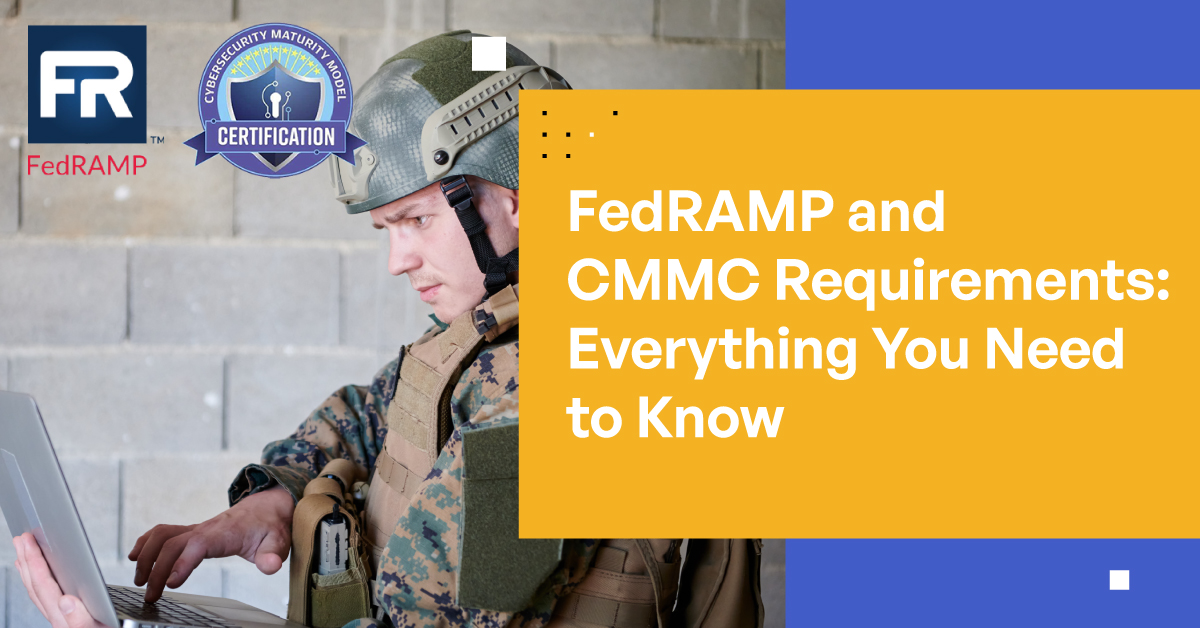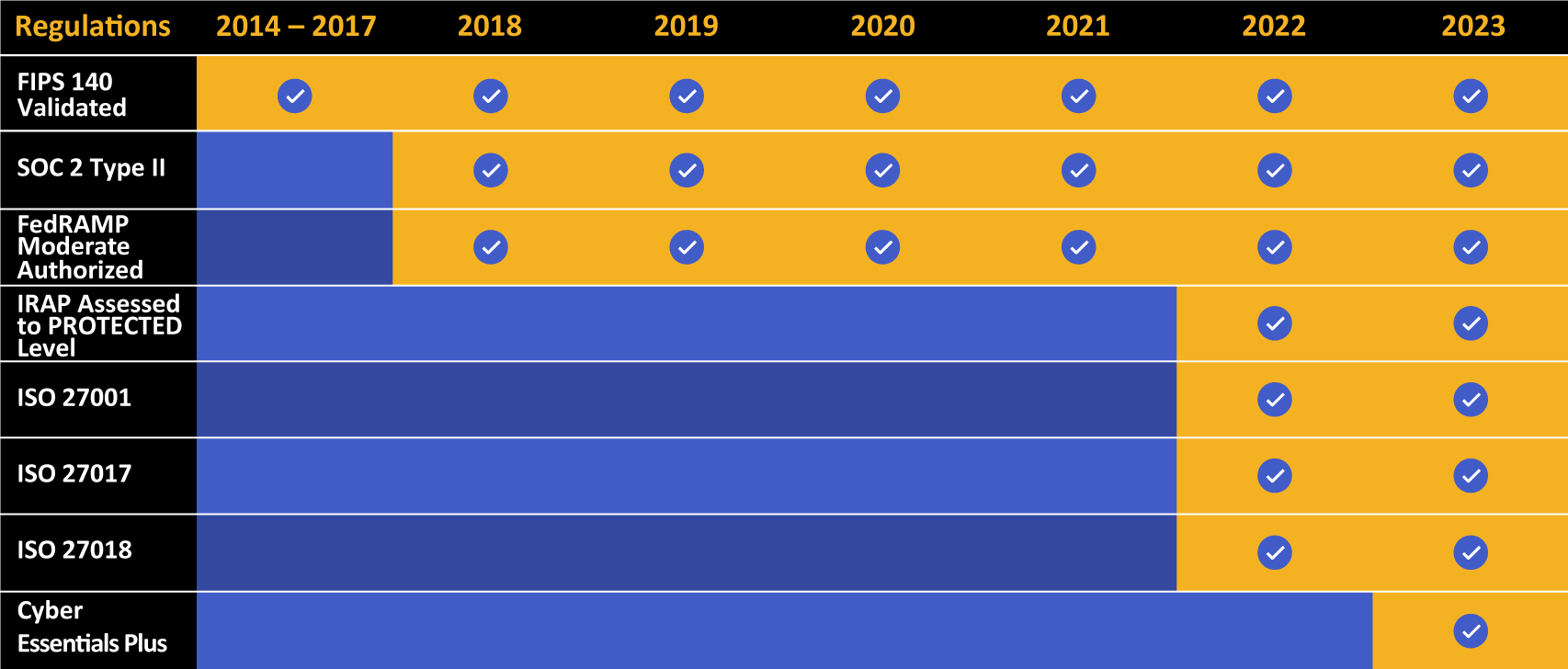FedRAMP and CMMC Requirements: Everything You Need to Know
As businesses increasingly rely on digital infrastructure to scale efficiently, the risk of cyber threats and data breaches continues to grow. The U.S. government has implemented cybersecurity frameworks to address this challenge, including the Federal Risk and Authorization Management Program (FedRAMP) and the Cybersecurity Maturity Model Certification (CMMC). This guide will explore these two programs in detail, including their requirements, benefits, and how to obtain certification.

Understanding Cybersecurity Frameworks
With the rapid growth of cloud-based services, which hold increasing amounts of sensitive data that is susceptible to unauthorized access, cybersecurity has become a top priority for businesses and governments. Cyberattacks and data breaches can lead to significant financial losses, reputational damage, and litigation. The U.S. government has established cybersecurity frameworks that standardize and improve cybersecurity practices across different industries and sectors to address these challenges.
One of the vital cybersecurity frameworks is the Federal Risk and Authorization Management Program (FedRAMP). FedRAMP provides a standardized approach to security assessment, authorization, and continuous monitoring for cloud-based services used by the federal government. Another framework is the Cybersecurity Maturity Model Certification (CMMC), designed to ensure that defense contractors and subcontractors meet specific cybersecurity requirements before bidding on government contracts.
FedRAMP Requirements and Benefits
The Federal Risk and Authorization Management Program (FedRAMP) is a government-wide program that provides a standardized approach to security assessment, authorization, and continuous monitoring for cloud-based services. The program was established in 2011 to address the challenges of cloud-based security and to promote the adoption of secure cloud solutions by federal agencies. Achieving FedRAMP authorization offers numerous benefits to businesses, including increased trust with government agencies, improved security posture and compliance with best practices, continuity of operations, and a streamlined process for gaining authorization. Additionally, businesses can leverage economies of scale through the sharing of security resources, reduced management overhead and audit costs, and the ability to offer cloud services to the federal government.
What Are the FedRAMP Requirements?
To obtain FedRAMP authorization, cloud service providers (CSPs) must undergo a rigorous security assessment process that includes three phases: Initiation, Security Assessment, and Authorization. During the assessment process, CSPs must meet the following requirements:
Implement NIST SP 800-53 Controls
FedRAMP requires CSPs to implement the National Institute of Standards and Technology (NIST) Special Publication (SP) 800-53 controls, which provide a comprehensive set of security controls for federal information systems.
Conduct an Independent Security Assessment
CSPs must engage an independent Third Party Assessor Organization (3PAO) to perform a security assessment of their cloud service offering (CSO).
Obtain an ATO From an Agency
CSPs must obtain an Authority to Operate (ATO) from a federal agency before providing their CSO to that agency.

Kiteworks touts a long list of compliance and certification achievements.
What Are the Benefits of FedRAMP Certification?
Achieving FedRAMP authorization requires a considerable outlay of time and resources. Most, if not all, organizations who have achieved FedRAMP authorization will admit, however, that the benefits far outweigh the costs. FedRAMP authorization, in fact, offers several benefits for cloud service providers and federal agencies, including:
Streamlined Security Assessments
CSPs that wish to work with multiple federal agencies can avoid multiple security assessments by obtaining a FedRAMP certification.
Cost Savings
CSPs can reduce the cost and effort associated with security assessments because FedRAMP authorization, which adheres to FedRAMP requirements, provides a standardized and consistent approach.
Improved Security
FedRAMP certification ensures that CSPs and their platforms meet rigorous security standards and are continuously monitored for compliance.
Trusted Service
FedRAMP certification provides federal agencies with a trusted and secure cloud service that meets their specific security requirements.
CMMC Requirements and Benefits
The Cybersecurity Maturity Model Certification (CMMC) is a new program that was introduced in 2020 to ensure that Department of Defense (DoD) contractors and subcontractors meet specific security requirements before they can bid on government contracts. It is designed to ensure that organizations have adequate security measures in place to protect federal contract information (FCI) and controlled unclassified information (CUI) within the defense industrial base (DIB). The CMMC provides five levels of increasing maturity, ensuring that organizations have the necessary practices and processes in place to safeguard government data and CUI. CMMC certification is an opportunity for defense contractors and subcontractors to demonstrate their commitment to cybersecurity and demonstrate to the DoD that they are serious about protecting sensitive information.
What Are the CMMC Requirements?
CMMC certification requires defense contractors to implement a set of cybersecurity practices and processes across five levels. Each level builds on the previous level, with Level 1 representing basic cybersecurity hygiene and Level 5 representing the most advanced cybersecurity practices. (Note: CMMC 2.0, introduced in November 2021, proposes reducing the maturity levels from five to three in an effort to streamline the framework by making it less costly and time-consuming.) The CMMC requirements include, but are not limited to:
Implementing Basic Cybersecurity Hygiene
Level 1 requires defense contractors to implement basic cybersecurity hygiene, such as using antivirus software and conducting regular backups.
Documenting Cybersecurity Practices
Level 2 requires defense contractors to document their cybersecurity practices and policies, including incident response and access control.
Implementing Intermediate Cybersecurity Practices
Level 3 requires defense contractors to implement intermediate cybersecurity practices, such as network segmentation and data encryption.
Reviewing and Measuring Practices for Effectiveness
Level 4 requires defense contractors to review and measure the effectiveness of their cybersecurity practices, including vulnerability assessments and penetration testing.
Optimizing Cybersecurity Practices
Level 5 requires defense contractors to optimize their cybersecurity practices based on continuous improvement and the latest cybersecurity trends and threats.
What Are the Benefits of CMMC Certification?
Demonstrating CMMC certification can increase marketability, improve security posture, and increase the trustworthiness of a company. CMMC certification can also help streamline security processes, resulting in improved efficiency, and further provide an edge over competitors by allowing them to bid on contracts that require CMMC compliance. Additional benefits include:
Ensuring the Protection of Controlled Unclassified Information (CUI)
CMMC certification ensures that defense contractors have implemented adequate cybersecurity measures to protect CUI, which is sensitive information that is not classified but still requires protection.
Enhancing the Security of the Defense Industrial Base
CMMC certification enhances the security of the defense industrial base (DIB) by ensuring that all defense contractors meet minimum cybersecurity requirements.
Increasing the Competitiveness of Defense Contractors
CMMC certification can increase the competitiveness of defense contractors by demonstrating their commitment to cybersecurity and their ability to meet government contracts’ requirements.
Streamlining the Procurement Process
CMMC certification can streamline the procurement process for government contracts by ensuring that all defense contractors meet the exact cybersecurity requirements.
How to Obtain FedRAMP Authorization and CMMC Certification
Obtaining FedRAMP authorization and CMMC certification can be complex and time-consuming processes. Still, they are essential for cloud service providers and defense contractors that want to do business with the federal government.
How to Obtain FedRAMP Authorization
To obtain FedRAMP authorization, cloud service providers must follow these steps:
Determine the Appropriate FedRAMP Baseline
CSPs must determine the appropriate FedRAMP baseline for their cloud service offering (CSO) based on the level of risk and impact on the federal information system.
Engage a Third Party Assessor Organization (3PAO)
CSPs must engage an independent Third Party Assessor Organization (3PAO) to perform a security assessment of their CSO.
Submit a Package to the Joint Authorization Board (JAB)
CSPs can submit their security package to the Joint Authorization Board (JAB), which is composed of representatives from the Department of Defense (DoD), Department of Homeland Security (DHS), and the General Services Administration (GSA).
Obtain an ATO From a Federal Agency
CSPs must obtain an Authority to Operate (ATO) from a federal agency before providing their CSO to that agency.
How to Obtain CMMC Certification
To obtain CMMC certification, defense contractors must follow these steps:
Conduct a Self-assessment
Defense contractors and subcontractors must conduct a self-assessment to determine their current cybersecurity maturity level.
Engage a CMMC Third Party Assessor Organization (C3PAO)
Defense contractors must engage a CMMC Third Party Assessor Organization (C3PAO) to assess their cybersecurity practices and processes.
Submit the Assessment to the Department of Defense
Defense contractors must submit the assessment to the Department of Defense (DoD) for review and approval.
Obtain a CMMC Certificate
Defense contractors meeting the CMMC requirements will receive a certificate valid for three years.
Kiteworks: Providing Solutions for FedRAMP Authorization and CMMC Certification Requirements
The Kiteworks private content network provides secure collaboration, file sharing, and file transfer services for private sector businesses and government agencies around the world. Kiteworks is FedRAMP authorized for moderate CUI and provides organizations a FedRAMP deployment option so they can demonstrate to their customers a commitment to the highest levels of data security and protection.
Kiteworks supports nearly 90% of CMMC 2.0 Level 2 requirements out of the box. Kiteworks for CMMC certification provides DoD contractors compliant solutions for secure email and secure file sharing, secure file transfer like managed file transfer (MFT) and secure file transfer protocol (SFTP), as well as secure web forms, APIs, secure plugins for enterprise applications like Salesforce (SFDC), Microsoft Office 365 (O365), Google (G Suite), and others.
With Kiteworks, security-first organizations like defense contractors can control access to sensitive information and ensure that only authorized personnel can access and share information. Kiteworks offers several security features, including a hardened virtual appliance, FIPS 140-2 validation, advanced encryption, multi-factor authentication, integrations with security tools like advanced threat protection (ATP), data loss prevention (DLP), security incident and event management (SIEM), and more.to protect the most sensitive and private content organizations share, ensuring that financial data, contracts, intellectual property, and personally identifiable information and protected health information (PII/PHI) is secure from unauthorized access and data breaches.
Kiteworks also provides a full audit trail and reporting capabilities that track who sends what to whom and when, in compliance with rigorous data privacy requirements and standards like Health Information Portability and Accountability Act (HIPAA), the General Data Protection Regulation (GDPR), California Consumer Privacy Act (CCPA), International Organization for Standardization (like ISO 27001), and others. To learn more about how Kiteworks can help your organization meet the requirements for FedRAMP Authorization and CMMC certification, and streamline the procurement process for government contracts, schedule a tailored demo today.

